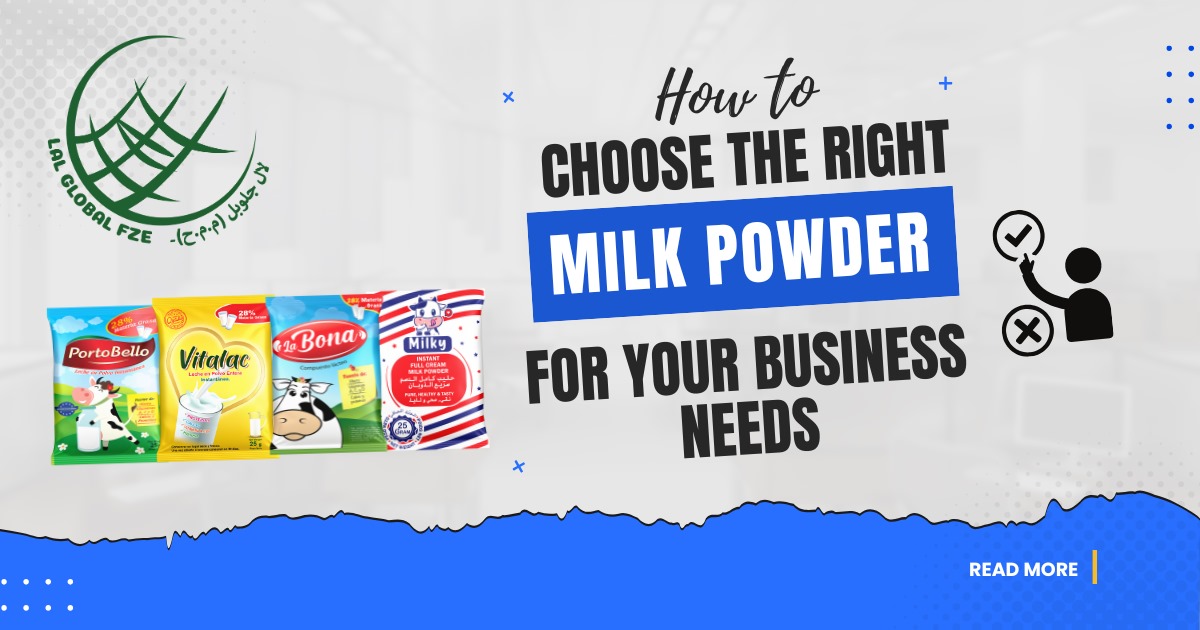Milk powder is a versatile ingredient with applications across food manufacturing, baking, confectionery, and more. For businesses in these fields, choosing the right milk powder can significantly impact product quality and customer satisfaction. This guide will walk you through key factors to consider to find the best milk powder for your business needs.
Understand Your Business Requirements
Before diving into product types, consider your business’s unique needs. Here are a few essential aspects to think about:
- Product Applications
Are you using milk powder in cooking, baking, beverages, or speciality items? Certain types of milk powder suit specific uses. For example, full cream milk powder might work better in creamy sauces or rich baked goods, while skimmed milk powder is ideal for lighter recipes.
- Volume Needs
Do you need bulk quantities for a large-scale operation, or are smaller amounts sufficient for a more specialized or artisanal product line? Clarifying this helps in choosing a supplier who can meet your volume requirements consistently.
Know the Different Types of Milk Powder
The type of milk powder you choose will depend on your product requirements and customer preferences. Here’s a quick look at the main types:
- Full Cream Milk Powder
Known for its rich flavour and high-fat content, full cream milk powder is perfect for creamy applications like desserts, sauces, and premium baked goods. The added fat gives a better taste and texture in many recipes.
- Skimmed Milk Powder
With reduced fat content, skimmed milk powder is ideal for low-calorie products. It’s widely used in health-conscious products or where the rich taste of full cream isn’t needed.
- Speciality Powders (e.g., Whey, Buttermilk)
These powders offer unique properties and are often used in specialized products like protein shakes or sports nutrition products. If your product line includes health or fitness-focused items, these can be great options.
Check Quality and Nutritional Standards
Quality matters in every business, and milk powder is no exception. Look for these indicators to ensure the product meets your standards:
- Certifications and Standards
Reliable suppliers will have certifications like ISO or HACCP, which demonstrate adherence to safety and quality standards. This is especially important if you’re in food manufacturing, where quality and safety are top priorities.
- Nutritional Content
Consider the nutritional needs of your target audience. For example, if your products are for health-focused consumers, higher protein content might be important. Reviewing the nutritional profile of the milk powder can help you pick the right type for your audience.
Consider Sourcing and Supply Chain Factors
How you source your milk powder is as important as the type you choose. Reliable sourcing ensures steady supply and quality. Here are some tips:
- Reliability of Supply
Working with a supplier who can consistently meet your demand is essential. Look for a track record of dependable service, as product shortages or delays can disrupt your production schedule.
- Geographical Location of Supplier
Sourcing locally might reduce shipping times and costs, while international suppliers might offer different pricing or product variations. Weigh the benefits of sourcing close by versus importing from trusted international sources.
Packaging and Private Labeling Options
Packaging plays an important role in keeping milk powder fresh and safe for use. Additionally, private labelling is a great way to build your brand identity.
- Custom Packaging
If you plan to resell or distribute the milk powder under your own brand, custom packaging can help your product stand out. Many suppliers offer private labelling services, allowing you to create branded packaging that resonates with your customers.
- Shelf Life and Storage
Make sure the packaging is durable and designed to keep the milk powder fresh. Airtight, moisture-resistant packaging helps extend the shelf life and ensures product quality over time.
Cost and Budget Considerations
Budget is always a factor in business decisions. Here’s how to balance quality with affordability:
- Price Comparison
Compare prices from different suppliers to get the best deal. However, remember that lower prices don’t always mean better value—consider both quality and cost.
- Bulk Discounts and Cost Efficiency
If you have storage capacity and high-volume needs, bulk purchasing can reduce costs. Many suppliers offer discounts for large orders, so it’s worth asking about bulk pricing.
Sampling and Product Testing
Before committing to a large order, it’s wise to test the milk powder to ensure it meets your needs.
- Request Samples
Most suppliers will provide samples so you can check the product’s quality firsthand. Testing a sample allows you to evaluate its taste, texture, and overall suitability for your recipes.
- Feedback from Clients or End Users
If possible, have a small group try out products made with milk powder. This feedback can be valuable in understanding how well the product meets customer expectations.
Final Thoughts
Choosing the right milk powder for your business is about aligning the product with your specific needs, from application and quality to cost and packaging. Take the time to evaluate these factors, research suppliers, and sample products before making your decision. By doing so, you can be confident that you’re choosing a milk powder that supports your business goals and satisfies your customers.

